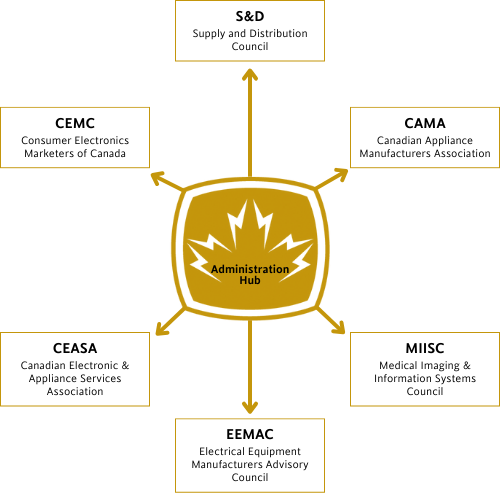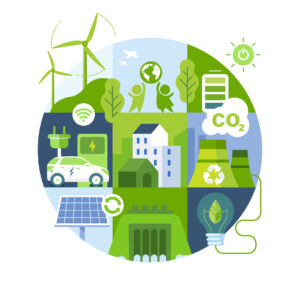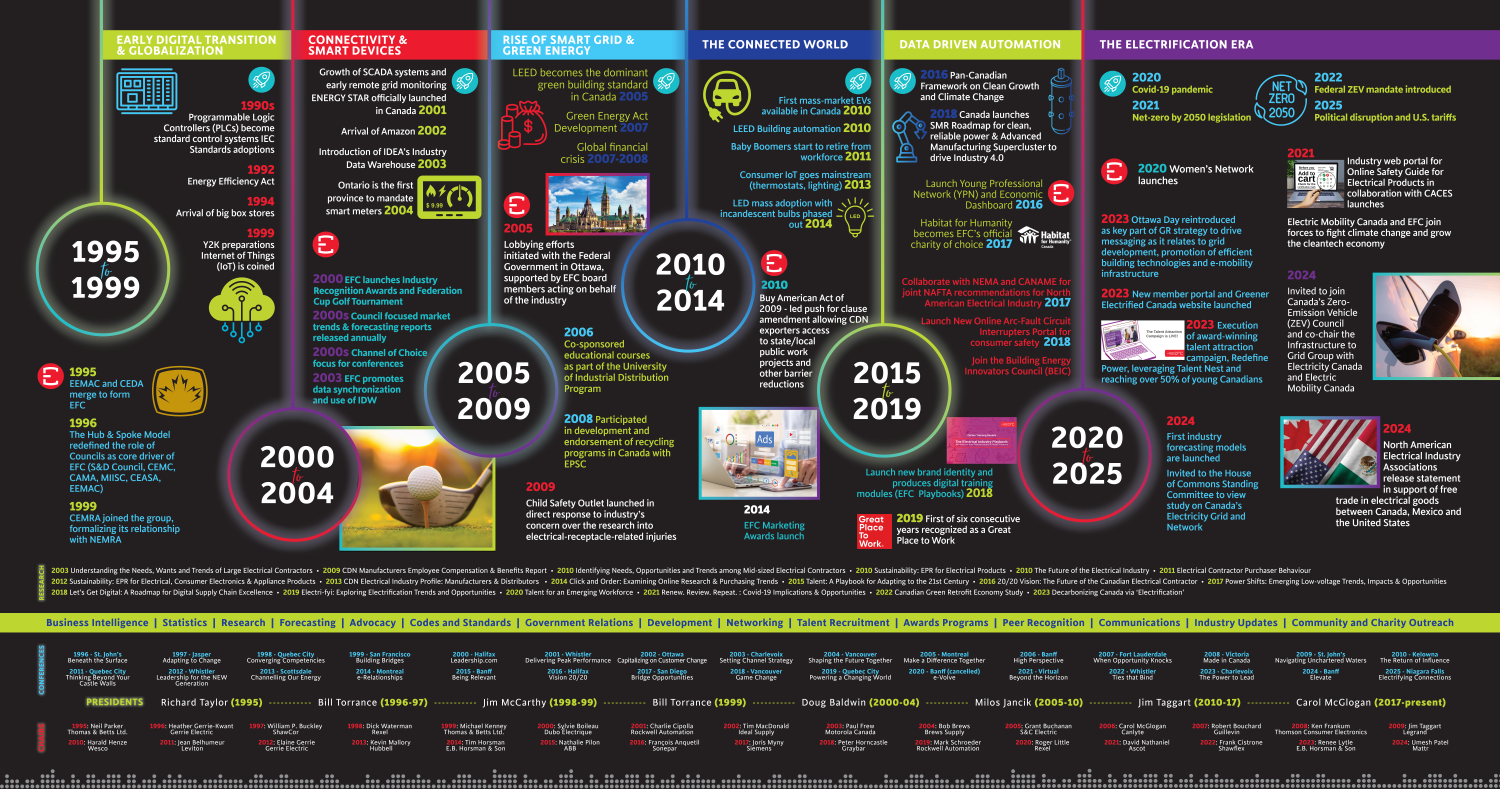
Celebrating 30 years of powering progress through innovation, collaboration, and industry leadership. As we celebrate this anniversary, we’re proud to reflect on the decades of transformation that have shaped EFC and the electrical industry across Canada.
1995-2004
Building the foundation
Early adaptability in response to the market laid the groundwork for the growth of both the industry and the association
-
The mid-1990s marked a transformative period for Canada’s electrical industry. With the implementation of the Energy Efficiency Act in 1992, the arrival of big box stores like Home Depot in 1994, and the industry-wide adoption of programmable logic controllers (PLCs) as standard control systems, a rapidly shifting industry sparked the birth of Electro-Federation Canada (EFC).
 In 1995, two established organizations – the Electrical and Electronic Manufacturers Association of Canada (EEMAC) and the Canadian Electrical Distributors Association (CEDA) – recognized the power of collaboration and merged to form EFC. This strategic union brought manufacturers and distributors together under one umbrella, creating a more unified voice for the electrical industry.
In 1995, two established organizations – the Electrical and Electronic Manufacturers Association of Canada (EEMAC) and the Canadian Electrical Distributors Association (CEDA) – recognized the power of collaboration and merged to form EFC. This strategic union brought manufacturers and distributors together under one umbrella, creating a more unified voice for the electrical industry. That same year, EFC launched a scholarship program designed to promote post-secondary education and employment in the electrical, electronics, and telecommunication fields, an initiative that continues to nurture talent for the industry today.
Growth through integration
 A pivotal moment in EFC’s early development came in 1996 with the implementation of the hub and spoke model, which redefined the role of the group’s internal councils as core drivers of the organization. This model established specialized councils, including the Supply and Distribution Council, the Consumers Electronics Marketers of Canada (CEMC), the Canadian Appliance Manufacturers Association (CAMA), the Medical Imaging & Information Systems Council (MIISC), the Canadian Electronic & Appliance Services Association (CEASA) and the Electrical Equipment Manufacturers Advisory Council (EEMAC).
A pivotal moment in EFC’s early development came in 1996 with the implementation of the hub and spoke model, which redefined the role of the group’s internal councils as core drivers of the organization. This model established specialized councils, including the Supply and Distribution Council, the Consumers Electronics Marketers of Canada (CEMC), the Canadian Appliance Manufacturers Association (CAMA), the Medical Imaging & Information Systems Council (MIISC), the Canadian Electronic & Appliance Services Association (CEASA) and the Electrical Equipment Manufacturers Advisory Council (EEMAC). “We were bringing all these independent associations together and we were learning a lot about each other,” reflects Heather Gerrie of Gerrie Electric, who served as chair in 1996. “It was critical for us to understand and share the opportunities, challenges and identify synergies amongst all of us to work toward solutions. We had a fantastic story to tell, and it was a very exciting time.”
 EFC continued to expand its influence through strategic integration of key organizations. In 1999, the Canadian Electrical Manufacturers Representatives Association (CEMRA) joined the group and formalized its relationship with the National Electrical Manufacturers Representatives Association (NEMRA), offering dual memberships to those joining EFC. This move strengthened the connection between Canadian and U.S. manufacturer representatives.
EFC continued to expand its influence through strategic integration of key organizations. In 1999, the Canadian Electrical Manufacturers Representatives Association (CEMRA) joined the group and formalized its relationship with the National Electrical Manufacturers Representatives Association (NEMRA), offering dual memberships to those joining EFC. This move strengthened the connection between Canadian and U.S. manufacturer representatives. The turn of the millennium brought new initiatives designed to strengthen industry connections. In 2000, EFC launched the Industry Recognition Awards to celebrate exceptional individual contributions to the Canadian electrical, appliance, electronics, or telecommunications industries. The same year saw the establishment of two signature networking events that would become industry traditions: the Quebec Golf Tournament in May and the Federation Cup Golf Tournament in August. These events, along with annual conferences held across North America, provided valuable platforms for industry professionals to connect, share insights, and build relationships – something former chair Charlie Cipolla of Rockwell Automation highlights as invaluable.
“EFC provides a terrific forum for people to meet at events – where else can you meet your competitors, your distributors and talk about common issues or problems . . . and then, in turn solve your problems? I don’t know how you put a price tag on that,” he says.
By 2004, the Canadian Electronic & Appliance Services Association (CEASA) rejoined EFC as a full council, further broadening the federation’s scope and industry representation.
Navigating industry transformations
 Throughout these foundational years, EFC demonstrated remarkable adaptability in responding to rapid industry changes. The organization helped members navigate Y2K preparations in 1999, the same year the term “Internet of Things” (IoT) was coined. The arrival of Amazon in 2002 signaled the dawn of e-commerce disruption, while Ontario’s 2004 mandate for smart meters heralded a new era in energy monitoring.
Throughout these foundational years, EFC demonstrated remarkable adaptability in responding to rapid industry changes. The organization helped members navigate Y2K preparations in 1999, the same year the term “Internet of Things” (IoT) was coined. The arrival of Amazon in 2002 signaled the dawn of e-commerce disruption, while Ontario’s 2004 mandate for smart meters heralded a new era in energy monitoring.“EFC has done a lot of good work on supporting codes and standards within Canada . . . a really good job on working on anti-counterfeiting measures and ensuring that product safety through anti-counterfeiting and codes and standards is first and foremost,” notes Grant Buchanan of S&C Electric, who served as chair in 2005, reflecting on the organization’s early impact through its first decade.
In just a decade, EFC established itself as an essential industry organization by bringing together diverse stakeholders, providing valuable services, and helping the electrical sector navigate technological and market transitions.
The foundation built on unity, adaptability and forward-thinking during these formative years helped EFC grow a strong platform to further lead the Canadian electrical industry through the even more dramatic changes of the decades to follow.
2005-2014
Navigating transformation
How EFC’s leadership positions the electrical industry for future success
-
 The decade spanning from 2005 to 2014 redefined how the electrical industry operates today. With a push for renewables and clean energy, widespread shifts toward further automation and robotics, and advancements in electric vehicles, the world was becoming more connected and efficient than ever before, and the industry celebrated major milestones, including the first mass-market electric vehicles becoming available in Canada (2010), the mainstreaming of consumer IoT (2013), and the mass adoption of LED technology (2014).
The decade spanning from 2005 to 2014 redefined how the electrical industry operates today. With a push for renewables and clean energy, widespread shifts toward further automation and robotics, and advancements in electric vehicles, the world was becoming more connected and efficient than ever before, and the industry celebrated major milestones, including the first mass-market electric vehicles becoming available in Canada (2010), the mainstreaming of consumer IoT (2013), and the mass adoption of LED technology (2014).Throughout these years, EFC maintained its role as an industry compass, helping members navigate technological disruption, economic challenges, and regulatory complexities, proving to be a steady hand guiding the industry through these significant shifts.
Prioritizing education and knowledge transfer

Although the 2007-2008 global financial crisis created economic turbulence, EFC helped members find their footing, using this time to rethink approaches and strengthen core business models. The initiatives during this period were designed to strengthen the industry’s resilience and foster innovation despite challenging market conditions, launching a legacy of commitment to education and professional development. These efforts included a series of educational courses sponsored by the Supply and Distribution Council as part of the 2006 University of Industrial Distribution program, and educational partnerships like the Industrial Distribution Leadership Certification Program (IDLCP) at Mohawk College in Ontario and the British Columbia Institute of Technology, in collaboration with the Power Transmission Distributors Association (PTDA), as part of the broader Industrial Careers Pathway Initiative in 2008. EFC expanded its educational reach in 2012 with the Electrical Products Education Course (EPEC) Bronze Level Program in French in partnership with National Association of Electrical Distributors (NAED), ensuring that training resources were accessible to professionals across the country.
Recognizing the valuable market insights and insider knowledge held within the organization, EFC prioritized industry research throughout this decade, publishing several reports both individually and through partnerships. EFC’s Click and Order: Examining Online Research & Purchasing Trends of Canadian Electrical Customers report, published in 2014, laid the groundwork for several more industry research reports to come in the following years, including Digital Supply Chains in the Electrical Industry (2018), Talent for an Emerging Workforce (2020) and Decarbonizing Canada via ‘Electrification’ (2023).
A spotlight on safety
Safety innovation became another hallmark of this decade, with the Child Safety Outlet initiative launching in 2009 in direct response to the industry’s concern over electrical-receptacle-related injury research. This commitment to consumer protection demonstrated EFC’s leadership in proactively addressing emerging safety concern, recalls Jim Taggart of Legrand Canada, who served as chair in 2009 and president from 2010-2017.
“EFC has done a great job in pushing forward the adoption of electrical safety products, such as ground fault and arc fault circuit interrupters,” he says. “Those products have saved lives and saved people from getting burned and injured.”
The following year, EFC launched an anti-counterfeiting campaign called “Don’t Be Shocked. Buy Authentic,” in conjunction with Electrical Safety Awareness Month, which 2005 chair Grant Buchanan of S&C Electric remembers as a key accomplishment. “EFC has done a lot of good work on supporting codes and standards within Canada, working on anti-counterfeiting measures and ensuring that product safety through anti-counterfeiting and codes and standards is first and foremost,” he says.
Establishing a powerful industry and advocacy voice
 Understanding the importance of policy influence, EFC initiated lobbying efforts with the federal government in Ottawa in 2005, supported by board members acting on behalf of the industry – a great effort, especially for an association in such early stages, Buchanan says. “A lot of companies with U.S.-based leadership were already lobbying, so we had to coordinate efforts so that we didn’t step on each other’s’ toes,” he recalls.
Understanding the importance of policy influence, EFC initiated lobbying efforts with the federal government in Ottawa in 2005, supported by board members acting on behalf of the industry – a great effort, especially for an association in such early stages, Buchanan says. “A lot of companies with U.S.-based leadership were already lobbying, so we had to coordinate efforts so that we didn’t step on each other’s’ toes,” he recalls.Despite the challenge, the power of collective advocacy would prove invaluable in the decades to come, says Tim MacDonald of Ideal Supply, who served as chair in 2002: “EFC having a presence in Ottawa and having Ottawa days and meeting with cabinet ministers and MPs and bureaucrats that have some influence on our industry – I think that’s one of the most positive things that over the years we have done.”
These capabilities proved particularly valuable in 2010 when EFC led a successful push for an amendment to the Buy American Act of 2009, which eased the clause allowing Canadian exporters access to state and local public work projects under the American Recovery & Reinvestment Act along with additional barrier reductions and fast-track provisions for dispute resolutions.
“This deal solidifies the importance Canadian companies play in the U.S. economy and allows our industry to once again access opportunities that will only strengthen both the U.S. and Canadian economies,” says Milos Jancik, who served as president of EFC from 2005 to 2010, regarding the Buy American Act amendment initiative.
A foundation for future success
From lobbying efforts and safety campaigns to educational programs and industry research, EFC’s leadership through years of uncertainty and change helped position its members for long-term success. Navigating the years between 2005 and 2014 wasn’t merely about surviving change – it was about embracing it and channeling it toward greater industry prosperity.
“EFC has really been the glue of the industry through good times and bad,” reflects Kevin Mallory of Hubbell Canada, who served as chair in 2013. “It’s certainly one of the strongest avenues for communication about what’s going on in the industry and all the players; they’ve really stepped up especially in recent years as a rallying point for communication and causes.”
2015-2025
Embracing the electrified future
EFC’s role in helping the industry compete and excel in an electrified world
-
If the first 20 years of Electro-Federation Canada (EFC)’s existence focused on growth and leadership, the most recent decade has seen the association transform into a competitive resource for its members. As the electrical industry faces challenge and uncertainty thanks to digital disruption, supply chain issues, talent shortages and regulatory shifts, EFC’s evolving offerings continue to help members thrive.
Market intelligence as a competitive advantage
The importance of informed decision-making has become more important than ever before, and this has especially been the case over the last decade. Industry 4.0 brought increased demand for smart devices and cloud-based platforms alongside growing concern for climate resilience and grid decentralization. Artificial intelligence changed the automation game, and renewable energy and global decarbonization efforts were underway. And just as industries began to feel cautiously optimistic, a global pandemic and trade conflicts created a lasting ripple effect of uncertainty.
In response to members’ need for more intel, EFC leveraged its data analytics capabilities in the form of the EFC Indicator, an economic report that was published three times per year before the launch of the an Economic Dashboard in 2016, which quickly became a one-stop shop for key market indicators, allowing companies to benchmark performance and identify emerging opportunities.
“The new dashboard comes at a time when EFC is shifting to offer more innovative and comprehensive statistical services to members,” said David Nathaniel, Standard Products, chair of EFC’s Statistical Committee, of the 2016 launch. “Together with the newly-formed Statistical Committee, we have launched this new platform to provide members with continuous updates on economic performance.”
This commitment to data-driven decision-making continued through 2024 with the introduction of industry forecasting models, a game-changer for strategic planning, as Mark Schroeder of Rockwell Automation, chair in 2019, recalls. “EFC has evolved as member needs have evolved. But the one thing as a manufacturer I keep coming back to is the trusted data… that allows us to gain perspective and make decisions,” he says. “As a manufacturer, we could provide sensitive data to EFC, and they treated it as such – and delivered generic data back to the industry that allowed us to gain perspective and make decisions. That’s critical.”
When traditional forecasting methods faltered during the COVID-19 pandemic, EFC’s rapid deployment of Pulse Polls provided members with critical real-time information needed to navigate unprecedented market volatility. This agile approach to market intelligence has become a permanent fixture, with quarterly polls continuing to provide competitive insights – something that Elaine Gerrie of Gerrie Electric, who served as chair in 2012, identifies as a key accomplishment for the group. “[EFC plays a large role in] bringing information and expertise to our membership, keeping us aligned and connected to our partners in the chain, giving us a platform for consistent movement for all distributors in their pursuit of advancing our industry, providing the statistics needed to drive our businesses, and aiding us with information and a government voice at times of crisis.”
Collaboration for competitive strength
One of EFC’s greatest strengths lies in its ability to bring industry stakeholders together through its expanding network system. The organization launched its Young Professional Network (YPN) in 2016, followed by the Women’s Network in 2020, creating platforms for these key demographic groups to connect and grow professionally. In recent years, specialized networks including IT and Supply Chain have been established to address emerging industry priorities and challenges, providing opportunities for all stakeholders within varying roles and levels of experience to network and grow.
This collaborative advantage proved especially valuable during recent market disruptions. When U.S. tariffs threatened to upend business models in 2025, EFC’s rapid creation of a tariff survey and centralized resource hub enabled members to quickly assess impacts and develop mitigation strategies. And, as various industries experience labour shortages, EFC’s award-winning talent campaign, Redefine Power, highlighted different careers within the electrical industry and drew attention to opportunities listed on the Talent Nest job board, paired with the development of EFC Playbooks to provide newcomers to the industry with valuable training resources.
As the years progress, EFC’s advocacy has been a constant contribution to the industry, positioning members at the forefront of Canada’s electrification movement through strategic government engagement. In 2022, EFC established the Greener Electrified Canada network, followed by the launch of a dedicated web portal in 2023 focusing on net-zero transition opportunities, keeping members informed and abreast of changes and emerging trends. Most notably, EFC’s 2024 invitation to join Canada’s Zero-Emission Vehicle (ZEV) Council, co-chairing the Infrastructure to Grid Group, placed members at the table where electric mobility infrastructure decisions are made.
“EFC is a catalyst for progress. I think that the next few years, much less 30 years, is going to be a fundamental shift for all of us,” notes Renee Lytle of E.B. Horsman & Son, who served as chair in 2023. “The companies and the leaders who thrive and embrace this change, who invest in technology and our people, and how we collaborate, will make a difference. And I think that EFC is uniquely positioned to help us collaborate and help us prepare for the future.”

 In response to members’ need for more intel, EFC leveraged its data analytics capabilities in the form of the EFC Indicator, an economic report that was published three times per year before the launch of the an
In response to members’ need for more intel, EFC leveraged its data analytics capabilities in the form of the EFC Indicator, an economic report that was published three times per year before the launch of the an  This collaborative advantage proved especially valuable during recent market disruptions. When U.S. tariffs threatened to upend business models in 2025, EFC’s rapid creation of a tariff survey and
This collaborative advantage proved especially valuable during recent market disruptions. When U.S. tariffs threatened to upend business models in 2025, EFC’s rapid creation of a tariff survey and 